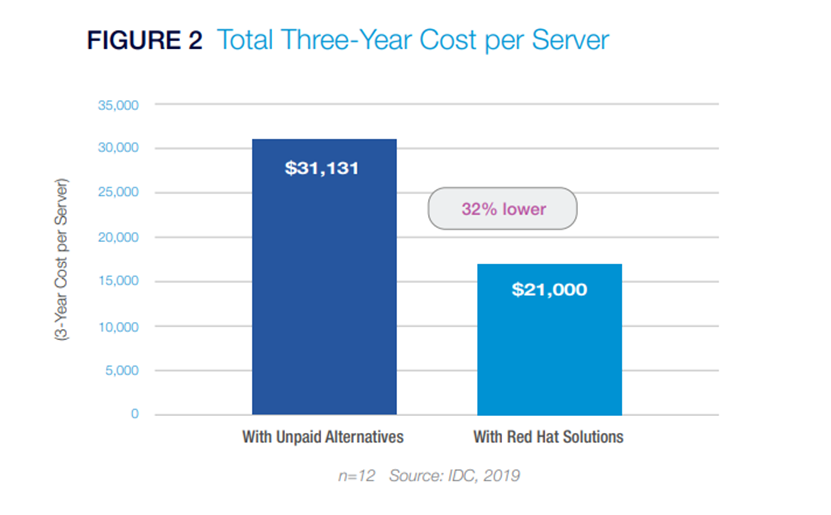
When it comes to enterprise software, businesses often choose “open-source” (typically associated with the word “free”) software in part because they hope to save money in the long run by not having to pay subscription fees. However, the higher operating expenses associated with self-supporting community-based infrastructure software considerably outweigh the cost of commercial subscription support, according to a plethora of studies conducted by IDC Business Value.
Paid VS Free
But what are the pros of paid vs free/open-source solutions? Red Hat has been a strong proponent of open-source, community-driven IT solutions that deliver exceptional performance on Linux and other platforms. But for organisations that demand more, these solutions are also available from Red Hat as part of a paid subscription plan, which includes access to premium features and customer support.
If you decide to go with the paid edition of Red Hat’s IT solutions, you’ll have access to the following benefits:
1.Streamlined IT Provisions
It is often believed that by using the free option, you would save money on IT solutions. IT solutions from Red Hat, for instance, are excellent both in their free and commercial versions. Some upscale amenities, however, can lead to a less expensive trip overall. Participants in the IDCs study said that compared to adopting free, community-supported alternatives, paying for Red Hat solutions helps them create a more streamlined IT infrastructure. Features of paid subscription systems that can help cut costs and increase your business value include the following:
- More virtualised servers (due primarily to the greater confidence Red Hat customers have that servers will not fail).
- Higher usage rates.
- Lower training expenses (due to Red Hat training and eliminating maintenance related to community-supported component changes and releases).
2.Cost Savings
This may seem counter-intuitive but when compared to free, community-supported alternatives, the cost of implementing, maintaining, and operating a business’s IT infrastructure can be significantly reduced by opting for Red Hat’s paid services. Some businesses use server resources more efficiently because they keep a greater virtualisation density (about 26% higher). In addition, the increased degree of automation makes provisioning and maintenance easier and faster, giving clients the assurance to virtualise these servers at large densities without fear of failure. According to IDC studies, using paid Red Hat software may reduce server deployment and operation costs by 32%.

3.Improved Productivity
Subscribers who shelled out for Red Hat products and services largely did so to improve internal IT operations, seeing as how vital such functions are to the success of any given firm.
They are cognizant of the need of equipping these groups with cutting-edge technological resources, and they take steps to do so. By utilising the automation and functionality of Red Hat solutions, they were able to free up people to focus on higher-level tasks, which in turn reduced the cost of providing IT services to their enterprises.
Several companies have pointed to this primary advantage of IT efficiency for IT infrastructure teams managing IT operations:
- Red Hat Enterprise Linux: Do More With Less — Spending less time on IT means a greater ROI and a higher income as a result of increased value creation through innovative software.
- Red Hat Ansible: Automated IT Solutions: – Hurrying through projects increases the likelihood of errors, which must subsequently be fixed. Red Hat’s vetted playbook has been thoroughly tested. As a result of being able to accomplish more with automation, the IT infrastructure team is 75% more productive.
When it comes to running your business, Red Hat thinks you shouldn’t have to foot the bill for open-source IT solutions. Avoid missing out on the chance to save costs in the long term and increase productivity by signing up for Red Hat IT solutions right now. Click on the link below to find out more.






